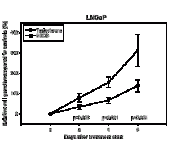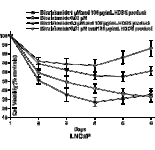Testosterone supplement causes aggressive prostate cancer
A designer supplement containing hormone ingredients left two men with an aggressive form of prostate cancer, write two researchers from Texas in Clinical Cancer Research. The makers of the supplement had added substances to the product that were not listed on the label.
Which product it is the researchers are not willing to say "for legal reasons". They do say that each capsule of the supplement contains, according to the label, 100 mg chrysin, 100 mg red deer velvet antler and 60 mg of a proprietary blend that contains six prohormones. The six prohormones, which are supposed to convert into testosterone, included -diones and -dioles.
Lab tests showed however that the supplement did not contain the ingredients named. Estradiol and testosterone did show up in the lab tests though. The product probably contained more active ingredients, reading between the lines of the description of the effects. One of the men – a black man aged 51 – had gained nine kilograms of muscle mass in eleven months. The other man – a white 67-year-old – had gained nearly five kilograms of muscle mass in six months and noticed that he also had more energy. Taking testosterone orally won't give you this effect.
Fitness magazines advertise the supplement. The men bought the product online because they wanted more muscles, energy and libido.
After eleven and ten months respectively the men became ill. They both lost a lot of weight. The doctors discovered that the men had prostate cancer. One already had secondaries in his lungs and brains. When the researchers wrote their article the men were still alive, but the disease was still very much present. The two men were given anti-androgens and medicines to block the production of LH.
*
To gain more certainty as to whether the supplements had caused the disease in the men, the researchers did an experiment with prostate cancer cells. They exposed the cells to the supplement [HDDS below, Ed.] and to testosterone.
The curves in the graph above show the speed at which the prostate cancer cells grew in a concentration of 100 micrograms of supplement per millilitre, and 24 picograms of testosterone per millilitre.
The researchers also did an experiment in which they exposed the cancer cells to the supplement and to the anti-androgen bicalutamide. And this is the most sinister part of the publication.
The graph above shows the vitality of the cancer cells. If you give them an anti-androgen only, their viability decreases. The more androgen effect there is, the quicker the prostate cancer cells grow. If you sabotage the androgen receptor, they die. The curve with the white circles shows this effect.
All the other curves in the graph represent cells that were exposed not only to the supplement but also to the cancer-inhibiting anti-androgen. At first the anti-androgen reduces the vitality of the cancer cells, but after a few days this effect disappears.
"These findings suggest that the HHDS product stimulates prostate cancer cell growth effectively, bypassing the androgen receptor pathway in prostate cancer cells, while also rendering the cancer cells resistant to standard antiandrogen therapy", the researchers write. "The data suggest a second nonandrogenic growth stimulatory effect of the HHDS, resulting in the activation of an alternative growth pathway that effectively bypasses the androgen receptor, causing resistance to the prostate cancer growth inhibitory actions of bicalutamide. To our knowledge, this is a new type of adverse effect from HHDS."
The supplement in question therefore contains unknown substances that not only have an effect on the androgen receptor, but also stimulate prostate cancer cells in some other way too.
The supplement is called Teston-6, according to
 contacts in the supplements world. Immediately after they had uncovered a relationship between prostate cancer and the supplement, the researchers informed the FDA. Teston-6 was removed from the market soon after. The American senator John Breaux tried to get a motion passed to regulate products like Teston-6, but the terrorist attacks of 9/11 intervened.[quackwatch.com September 10, 2001]
contacts in the supplements world. Immediately after they had uncovered a relationship between prostate cancer and the supplement, the researchers informed the FDA. Teston-6 was removed from the market soon after. The American senator John Breaux tried to get a motion passed to regulate products like Teston-6, but the terrorist attacks of 9/11 intervened.[quackwatch.com September 10, 2001]
Source:*
Clinical Cancer Research 14, 607-611, January 15, 2008.
A designer supplement containing hormone ingredients left two men with an aggressive form of prostate cancer, write two researchers from Texas in Clinical Cancer Research. The makers of the supplement had added substances to the product that were not listed on the label.
Which product it is the researchers are not willing to say "for legal reasons". They do say that each capsule of the supplement contains, according to the label, 100 mg chrysin, 100 mg red deer velvet antler and 60 mg of a proprietary blend that contains six prohormones. The six prohormones, which are supposed to convert into testosterone, included -diones and -dioles.
Lab tests showed however that the supplement did not contain the ingredients named. Estradiol and testosterone did show up in the lab tests though. The product probably contained more active ingredients, reading between the lines of the description of the effects. One of the men – a black man aged 51 – had gained nine kilograms of muscle mass in eleven months. The other man – a white 67-year-old – had gained nearly five kilograms of muscle mass in six months and noticed that he also had more energy. Taking testosterone orally won't give you this effect.
Fitness magazines advertise the supplement. The men bought the product online because they wanted more muscles, energy and libido.
After eleven and ten months respectively the men became ill. They both lost a lot of weight. The doctors discovered that the men had prostate cancer. One already had secondaries in his lungs and brains. When the researchers wrote their article the men were still alive, but the disease was still very much present. The two men were given anti-androgens and medicines to block the production of LH.
*
To gain more certainty as to whether the supplements had caused the disease in the men, the researchers did an experiment with prostate cancer cells. They exposed the cells to the supplement [HDDS below, Ed.] and to testosterone.
The curves in the graph above show the speed at which the prostate cancer cells grew in a concentration of 100 micrograms of supplement per millilitre, and 24 picograms of testosterone per millilitre.
The researchers also did an experiment in which they exposed the cancer cells to the supplement and to the anti-androgen bicalutamide. And this is the most sinister part of the publication.
The graph above shows the vitality of the cancer cells. If you give them an anti-androgen only, their viability decreases. The more androgen effect there is, the quicker the prostate cancer cells grow. If you sabotage the androgen receptor, they die. The curve with the white circles shows this effect.
All the other curves in the graph represent cells that were exposed not only to the supplement but also to the cancer-inhibiting anti-androgen. At first the anti-androgen reduces the vitality of the cancer cells, but after a few days this effect disappears.
"These findings suggest that the HHDS product stimulates prostate cancer cell growth effectively, bypassing the androgen receptor pathway in prostate cancer cells, while also rendering the cancer cells resistant to standard antiandrogen therapy", the researchers write. "The data suggest a second nonandrogenic growth stimulatory effect of the HHDS, resulting in the activation of an alternative growth pathway that effectively bypasses the androgen receptor, causing resistance to the prostate cancer growth inhibitory actions of bicalutamide. To our knowledge, this is a new type of adverse effect from HHDS."
The supplement in question therefore contains unknown substances that not only have an effect on the androgen receptor, but also stimulate prostate cancer cells in some other way too.
The supplement is called Teston-6, according to

 contacts in the supplements world. Immediately after they had uncovered a relationship between prostate cancer and the supplement, the researchers informed the FDA. Teston-6 was removed from the market soon after. The American senator John Breaux tried to get a motion passed to regulate products like Teston-6, but the terrorist attacks of 9/11 intervened.[quackwatch.com September 10, 2001]
contacts in the supplements world. Immediately after they had uncovered a relationship between prostate cancer and the supplement, the researchers informed the FDA. Teston-6 was removed from the market soon after. The American senator John Breaux tried to get a motion passed to regulate products like Teston-6, but the terrorist attacks of 9/11 intervened.[quackwatch.com September 10, 2001]Source:*
Clinical Cancer Research 14, 607-611, January 15, 2008.

